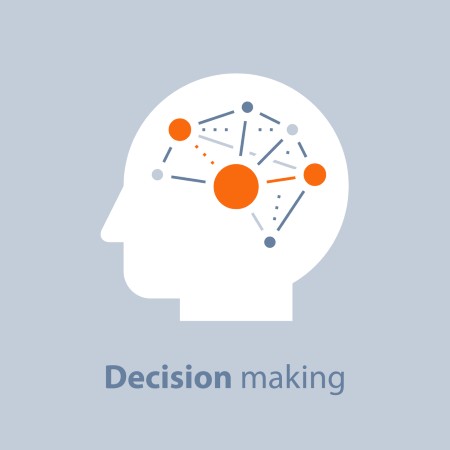
Every day is full of choices. A study by Columbia University found that we're bogged down by a good 70 decisions per day.
Some choices are straightforward for example, what to take for lunch or how to get to work. Others are more difficult to make, like choosing between two job opportunities and whether or not to relocate to a new city for someone you love or if you should eliminate a person who is toxic of your life.
You'll be satisfied and successful if you can prioritize your choices.
Although there are many strategies that people have succeeded in using for their decision-making, the following are the best of the crop.
1. They make routine, small-scale decisions.
The process of making decisions is similar to a muscle. It gets tired when it is used throughout the day. To fight off fatigue caused by decision making, one of the most efficient strategies for people who succeed is to make small-scale decisions, and then transform these into routines. This frees up brain resources for more complex decisions.
Steve Jobs famously wore a black turtleneck every day to work. Mark Zuckerberg still wears a sweatshirt. Both men said that the iconic images were the result of their everyday routines that helped reduce their decision fatigue. Both men were aware of the limits of our everyday decision-making abilities. Barack Obama said that his attire was primarily gray and blue suits. I'm trying to pare down choices. Because I have several other things to consider I don't want to be tasked with making decisions regarding what I eat or wear.
Identify the decision. Recognizing the opportunity or problem is the first step towards making the right decision. Determine why you think this decision will be beneficial to your customers and your colleagues. To discover additional information on making decision, you've to browse random country site.
2. They make important choices every day.
Another great way to beat the fatigue of making decisions is to save small decisions for later (when decision fatigue is the highest) and to tackle complex decisions in the morning, in the morning, when your brain is fresh. When you're faced with a flood of critical choices, one great strategy is to wake up early and work on the most difficult tasks prior to being confronted with distractions (phones ringing, emails coming in). A similar strategy is to complete a few small tasks the night before to get a head start on the day that follows. Set out your clothes before bed so that you don't need to think about them when you get up.
3. They are attentive and can get their feelings.
There is a phrase that says "Don't make decisions solely on your emotions" and it is true. Successful people recognize and understand their emotions (including their intensity and effect on behavior) in order to be capable of looking at their decisions as objectively and rationally as is possible.
Many people struggle with in recognizing and controlling their emotions. TalentSmart tested over one million people and found that just 36% can accurately recognize their emotions. If you're skilled decision makers, however they are aware that bad moods can trigger people to become angry or drift from their moral compass as easily as positive moods can lead people to be confident and indecisive.
4. They are objective in evaluating their opinions.
When really wrapped up in a decision, successful people weigh their options against the criteria they have set as they are aware that this makes decision-making simpler and more efficient. Here are some useful guidelines to take into consideration:
What are the benefits from this choice?
How can it hurt me?
What is the benefit to What is the benefit to
What is the cause?
Do I regret this decision?
Do I regret taking this decision?
Does this decision reflect my beliefs?
5. They sleep on decisions.
The time you spend sleeping on your decision will ensure that you are in a state of mind when you approach it the next day. It also allows time for your emotions to take through their course. If you react too fast it is easy to react, but when you give more focus and consideration to your choice you uncover important aspects of it that you didn't recognize before.
6. They won't be waiting for too long.
Successful people are aware of how important it is to gather all the information they can, however at the same time, they make certain not to fall prey to the analysis insanity. Successful people don't sit around waiting for the stars to align. They realize that they need to have a plan to reach their goals. Once they've set the date, they're driven to conduct their research and some soul-searching in order to meet that deadline.
7. They use exercise to recharge.
The anxiety of a big decision naturally releases cortisol. the chemical responsible for triggering the fight or flight response. Cortisol can hinder your ability to think clearly, rationally and effectively. Exercise is a great way to lessen stress and anxiety when making a decision. It only takes 30 minutes to feel a high endorphin-fueled buzz which will allow you to get back to your mental clarity. The cortisol can also be utilized to help get over the fear or flight response. Research has shown that regular exercise improves the overall functioning of the brain regions that are responsible for making decisions.
8. They always go back to their moral base.
When it comes to making crucial choices, successful people recognize how important it is to adhere to their values. If your emotions are pushing you in the opposite direction, your morals are able to guide you.
9. They seek advice from an outside source.
We are prone to select an alternative option to make a choice and then collect the data needed to support the decision. This is also known as confirmation bias. To overcome confirmation bias, it is crucial to seek out opinions from outside sources and advice from others who are of different opinions. Their opinions can help you assess your options more objectively and recognize your own subjective or unjustified tendency.

10. They consider previous decisions.
Mark Twain said that decision-making is complex. He also said that making mistakes is not the only method of learning. It's merely a way to recall past decisions. People who are successful have enough knowledge of their previous decisions to be capable of applying their past decisions to any situation in the future.
The consequences can last days, weeks and even years, making smart decisions is a task worth every bit of your time and energy.
Comments
Post a Comment